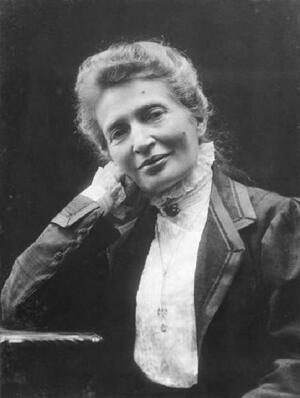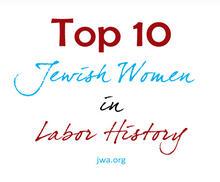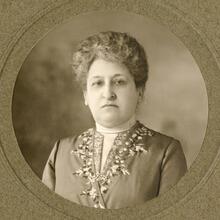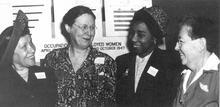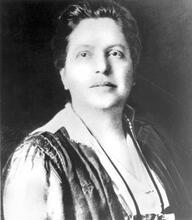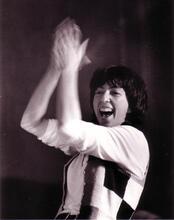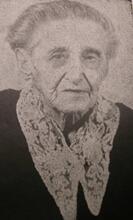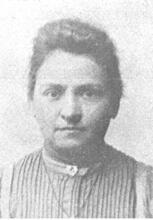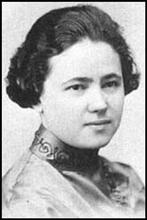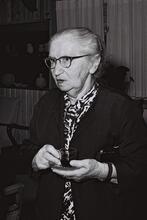Anna Kuliscioff
Born in Russia but educated in Switzerland, Anna Kuliscioff quickly turned to radical politics. To avoid imprisonment, Kuliscioff was forced to emigrate, eventually settling in Italy. Kuliscioff’s feminist advocacy centered around poor women, which was rare for her time, and she advocated for equal pay, freedom from spousal and workplace exploitation, and wages for housework. After her physical health deteriorated, she focused on publishing a socialist periodical and hosting a prominent salon for journalists, socialist leaders, and workers asking for advice, often with her partner Filippo Turati. Kuliscioff remained active until the end of her life, advocating for suffrage, paid maternity leave, and many other issues.
Early Life
Russian revolutionary, internationalist, early feminist, doctor, and one of the founding generation of Italian socialists, Anna Kuliscioff was born Anja Moiseevna Rozenstein, near Simferopol in the Crimea, between 1854 and 1857. Her father, Moisei, was one of the five hundred privileged Jewish “merchants of the first guild” who were permitted to reside anywhere in Russia.
In 1871, after studying foreign languages with private tutors, Anja was sent to study engineering at the Zürich Polytechnic, where she also took courses in philosophy. Political exiles, in whom the city abounded, introduced her to anarchist and populist notions. Abandoning her studies, in 1873 she married Pyotr Marcelovich Macarevich, a fellow revolutionary of noble birth, and together they returned to Russia. There they worked for revolutionary factions, first in Odessa and then in Kiev. In 1874 Macarevich was sentenced to five years of hard labor for his anarchist activities. He died in prison.
Emigration from Russia
In order to avoid arrest, Anja fled Odessa to live clandestinely, first in Kiev and then in Kharkov, often singing in public parks to earn a living. In Kiev she allied herself with radicals associated with the Land and Liberty party, who fomented peasant uprisings and engaged in terrorist acts against the tsarist authorities. When her colleagues in this armed group were arrested, she managed to escape. In April 1877, using a false passport, she left Russia and moved to Paris, where she became a member of a small anarchist group that, following Bakunin, preached the abolition of the state. One of the group’s members was an Italian, Andrea Costa, with whom she had a passionate relationship that endured for five years. During that period, they were constantly separated by imprisonment and exile.
It was in Paris that Anja was first documented, in police records, as bearing the name Kuliscioff, an invented name that identified her as coming from the East.
Under constant police surveillance, Kuliscioff was imprisoned by the French authorities, released only due to the intercession of the Russian novelist Ivan Turgenev, who was fascinated by her beauty and personality, and expelled from the country. She and Costa renewed their activities and their liaison in Italy, where she was again imprisoned in 1879, charged with plotting against the state, tried, and, after thirteen months in prison, acquitted. At this trial Kuliscioff defined herself as a Russian revolutionary socialist. The couple next fled to Lugano, where they attempted to set up an anarchist journal, the International Socialist Review. For the third time in two years since leaving Russia, Kuliscioff was arrested and jailed. When they were finally at liberty and together, Costa had to return to Italy in 1880 to continue his political work. During her various periods of imprisonment, Kuliscioff contracted tuberculosis and later developed a severe bone disease.
Beliefs and Feminist Activism
Reunited with Costa in 1881 in his hometown of Imola, Anna gave birth to a daughter, Andreina, in December of that year. Costa, however, despite his advanced political views (he was to become the first socialist deputy in the Italian parliament), was a conventional and repressive partner and the liaison ended with Kuliscioff leaving Italy with her infant daughter to study medicine in Bern, Switzerland, against Costa’s wishes. In 1884, for health reasons, she went to continue her studies in Naples, where Costa visited her from time to time. Despite her poverty, she graduated as Doctor of Medicine in 1885, after having taken additional courses in Turin and Pavia to complete her specialization in obstetrics and gynecology. She opened a medical practice in Milan, caring for working women and the poor, but abandoned it in 1891 because of her ill health and because she wished to devote herself to politics. Kuliscioff soon became one of Italy’s leading feminists, together with the upper-class Anna Maria Mozzoni (1837–1920), who was then engaged in a battle for the admission of women to universities and qualified women to the professions. It was Mozzoni who introduced Kuliscioff to Italian feminism, which had begun to develop some ten years before her arrival in Italy. (In 1879 Mozzoni had published her translation into Italian of On the Subjection of Women by John Stuart Mill.)
Kuliscioff, however, was chiefly concerned with the conditions of women in the working class—those whom she came to know intimately through her profession as a doctor—and in this she was very different from most early European feminists, who were overwhelmingly middle class and very often conservative in the political sense. On April 27, 1890, she made her first appearance on a public platform on the feminist question, speaking at the Circolo Filologico in Milan. Published immediately, the talk, entitled “The Monopoly of Man,” was an influential feminist tract, which stressed the differences between her ambitions and those of Mozzoni and other early feminists of her sort. Kuliscioff argued not only for women’s education and social equality, but for their political rights; she appealed for equal pay for women and protested against women’s exploitation by both their employers and their husbands. Such ideas were completely new in Italy. Kuliscioff even argued that women should be paid for housework as an occupation, and in this she was ahead of her time, even today. But she never saw women merely as victims of the system. She thought that her own sex was essentially reactionary and conservative, and deplored the lack of solidarity among women from different classes.
Much of this probably related not just to her socialist beliefs but to her Jewish background. Kuliscioff herself belonged to the first generation of Jewish women to receive the kind of secular education previously available only to men. More importantly, the views she expressed on the relations between the sexes were based on the notion that shared ideas and shared interests are essential to a good marriage. This was particularly revolutionary in the Jewish context, in which for centuries Jewish women had been excluded from the tradition of learning and men and women’s spheres had been quite separate.
In 1885 Mozzoni had introduced Kuliscioff to Filippo Turati (1857–1932), a Milanese lawyer and poet. Under her influence, he absorbed Marxist doctrine and emerged as the charismatic leader of the budding Italian Socialist party (PSI). Turati and Kuliscioff formed one of the most important partnerships in European socialist history, living and working together for the next quarter of a century—a partnership which finally realized Kuliscioff’s ideal. In 1889 the couple founded the Milan Socialist League, a group made up of both workers and liberal intellectuals; based on the Russian model, this was an entirely new departure in Italian political history. This League formed the basis of the Italian Socialist party (PSI) established in 1893.
Two years earlier the couple had founded the famous journal Critica Sociale, a review of cultural and political events which contributed to the formation of a new socialist ideology based on Marxist theory. Kuliscioff and Turati wrote numerous articles, many of which were joint efforts, signed with the initials “T.K.” or with “Noi” (We). Kuliscioff was not only responsible for the technical aspects of production, but also solicited contributions from distinguished foreign contributors such as Engels, August Bebel and Jean Jaurès. Prominent among the journal’s tenets was universal suffrage, and here Kuliscioff’s political and feminist beliefs converged, in essays on women’s emancipation, under her own name. Kuliscioff was an ardent disciple of Bebel, who had introduced the “woman question” into Marxism, and believed, like him, that the working class and women were two subject peoples whose liberation would coincide. However, Italy was one of the most backward countries in Europe. Anna described it as “a country which is two-thirds medieval, and in which the peasantry lives in conditions similar to France at the Revolution.”
From 1891, Kuliscioff and Turati lived near the Duomo, above the Galleria Vittorio Emanuele II. Their apartment soon became a salon that every day hosted not only journalists and socialist leaders but also seamstresses and even rice pickers from the Lombardy countryside who came to her for advice. The visitors came in shifts, after lunch and before dinner. During their long struggle on behalf of socialism and feminism alike, Kuliscioff was far more radical than Turati, criticizing him and the party for their half-hearted support for women’s rights, while also deploring the lack of solidarity among women of all classes. However, during the last years of the nineteenth century, when Turati took part in local government in Milan, he and Kuliscioff used their influence in the working class in the region to organize mass rallies, intended to draw the attention of the Italian parliament to the new industrial hazards affecting women and children. This was the first direct attempt by the Italian working class to influence legislation.
Later Life
At the beginning of the twentieth century, Kuliscioff herself helped formulate the first Italian laws protecting working women, her main contribution to Italian politics and social welfare. In 1902 her lobbying led to the passing of labor laws to protect women and children. In 1912 Kuliscioff founded the bi-monthly La Difesa delle Lavoratrice (The Defense of Women Workers), the official periodical of the Labor Organization of Socialist Women. She fought tirelessly for her own party to support suffrage for women of all classes. Finally, the PSI proposed such an amendment, but in 1912 it was rejected by the Chamber of Deputies—composed entirely of men. Indeed, the struggle for Italian women’s suffrage was not resolved until many years after Kuliscioff’s death, on December 27, 1925.
Anna Kuliscioff was typical of many politically involved young Jewish women from Russian families whose parents had so recently become emancipated. Ironically enough, such young women actually did all they could to divest themselves of their privileges; Kuliscioff herself is said to have torn up her student’s card in Zürich, thereby putting back her studies by a decade, and then chose medicine as a way of combining her political beliefs and her profession. In her private life, while she never returned to her Jewish parents’ home, she remained close to them; her father went on remitting funds to her, both for herself and her illegitimate child, and she met him regularly in Europe until the end of his life. She herself did not force her own ideas on her daughter, a placid, home-loving girl who in 1904 married Luigi Gavazzi, son of a conventional Milanese Catholic family, and she became a loving grandmother to the couple’s five children.
While Anna Kuliscioff never again belonged to a Jewish community and played no part in Jewish communal affairs, she rejoiced at the 1917 Balfour Declaration promising a national home to the Jews in Palestine. In a rare reference to the fate of the Jews, she criticized the then Italian Prime Minister Vittorio Orlando (1917–1919), when in his inaugural speech on foreign policy he referred to Palestine only as “The Holy Land of the Sepulchre,” without mentioning “the people persecuted in almost all of Europe, which will finally have its own place of refuge from all pogroms, including those carried out by the Russian revolutionaries.”
Kuliscioff’s death elicited quiet respect from crowds that gathered under her window on the Piazza del Duomo in anticipation of her funeral procession, but the procession itself was disrupted, the flowers and wreaths rudely destroyed, by Fascist thugs. Historian Luigi Salvatorelli bitingly commented: “Fascism did far worse things, but perhaps nothing revealed more clearly its irrevocable moral repugnance.”
Addis Saba, Marina. Anna Kuliscioff: Vita private e passione politica. Milan: 1993.
Agnelli, Ardvino. “La Kuliscioff e il socialismo internazionale.” In Anna Kuliscioff e l’Età del Riformismo.
Atti del Convegno di Milano, Dicembre 1976.
Albonetti, Pietro, ed. Anna Kuliscioff: Lettere d’amore a Andrea Costa, 1880–1909. Milan: 1979.
Ballestrero, Maria Vittoria. "Anna Kuliscioff, women's work and citizenship. A look from the present." Labor and law 31, no. 2 (2017): 187-216.
Boxer, Marilyn, and Jean H. Quataert, eds. Socialist Women: European Socialist Feminism in the Nineteenth and Early Twentieth Centuries. New York: 1978.
Bilski, Emily D., and Emily Braun. Jewish Women and Their Salons. Exhibition Catalog, The Jewish Museum. New York: 2005, 76–83, 199–200.
Casalini, Maria. La signora del socialismo italiano. Vita di Anna Kuliscioff. Rome: Editori Riuniti, 1987.
Cherikover, Eliyahu. Jews in Revolutionary Times: Revolutionary and Nationalist Ideology among the Russian Jews during the 1870s and 1880s (Hebrew). Tel Aviv: 1957.
Deich, Lev. “Anna Rozenstein Macarevich.” In Rol' evreev v russkom revoliutsionnom dvizhenii. (The Role of the Jews in Russian Revolutionary History). Berlin: 1923.
Hertz, Deborah. "Dangerous Politics, Dangerous Liaisons : Love and Terror among Jewish Women Radicals in Czarist Russia." Histoire, Économie Et Société 33, no. 4 (2014): 94-109.
LaVigna, Claire. Anna Kuliscioff: From Russian Populism to Italian Reforism, 1873-1913. New York: 1991.
Marteli, Mino. Andrea e Anna Kuliscioff. Milan: 1980.
Punzo, Maurizio. "The" living room "of Anna Kuliscioff and Social Criticism." In Forum Italicum, vol. 54, no. 1, pp. 312-330. Sage UK: London, England: SAGE Publications, 2020.
Shepherd, Naomi. A Price Below Rubies: Jewish Women as Rebels and Radicals. London: 1993.
Stites, Richard. The Women’s Liberation Movement in Russia: Feminism, Nihilism and Bolshevism, 1860–1930. Part III. Princeton: 1978.
Turati, F., and A. Kuliscioff. Carteggio, edited by A. Schiavi. Milan: 1954–1978 (7 vols.).

